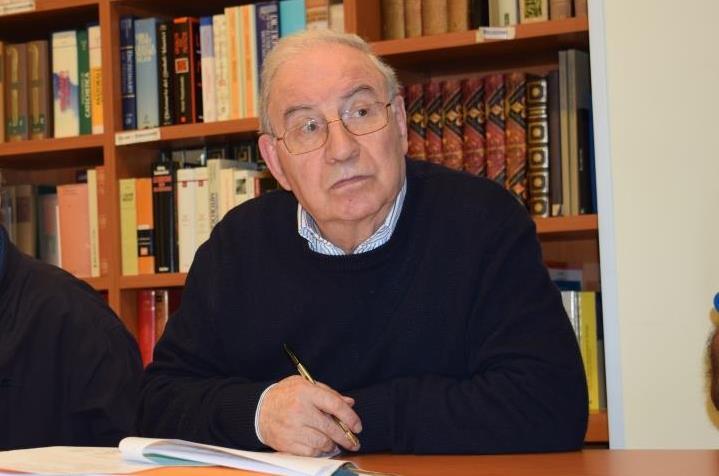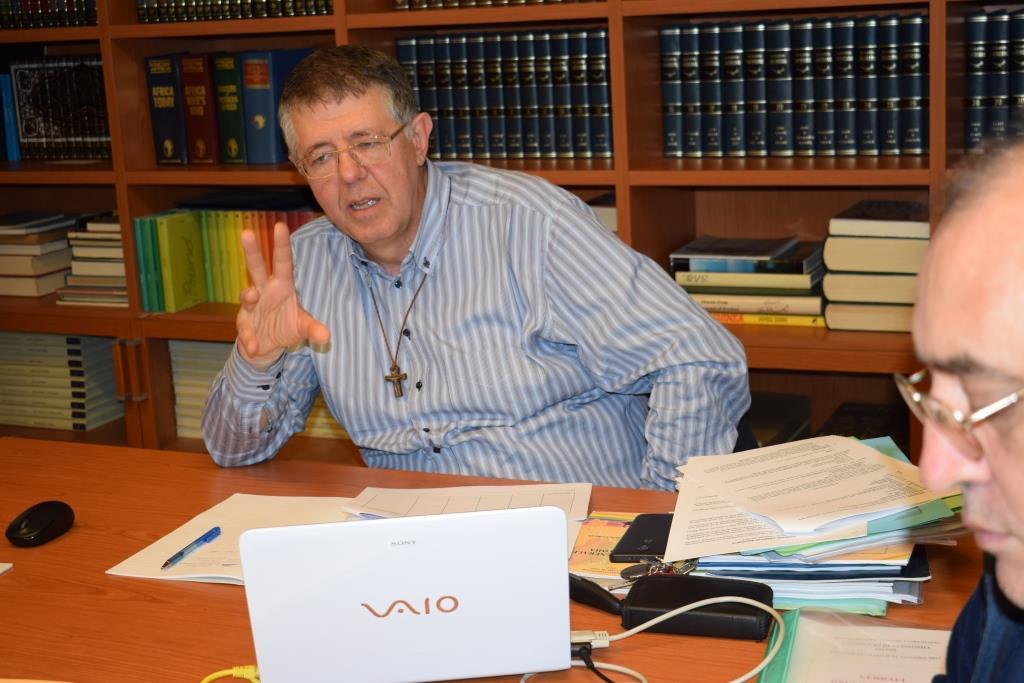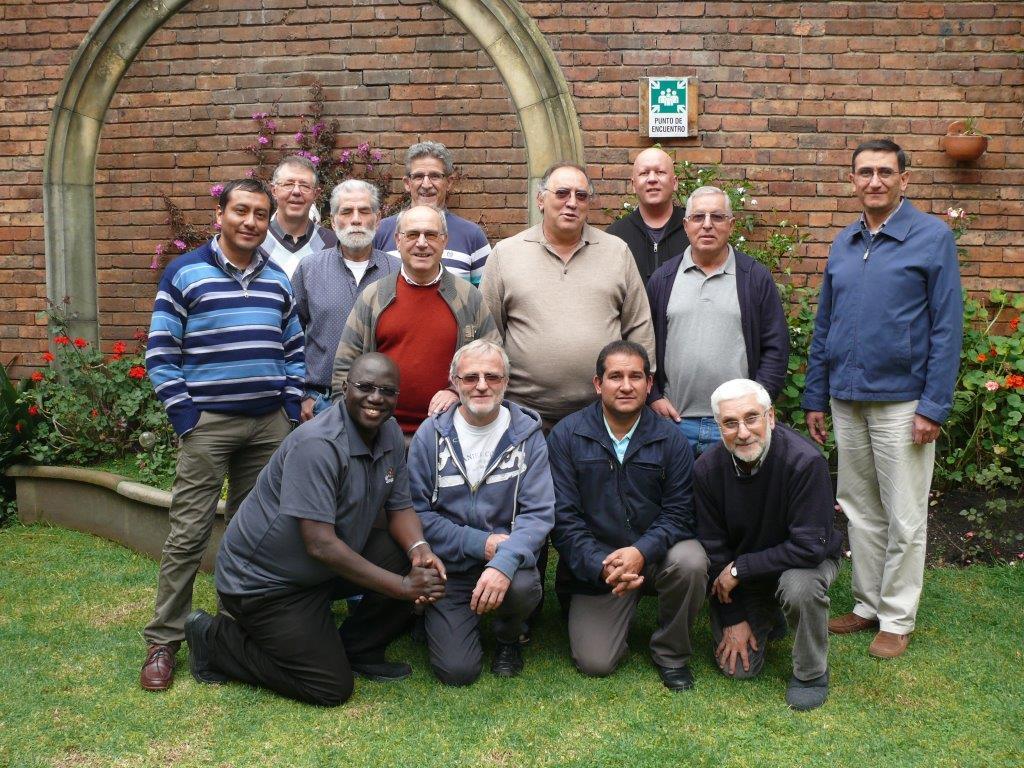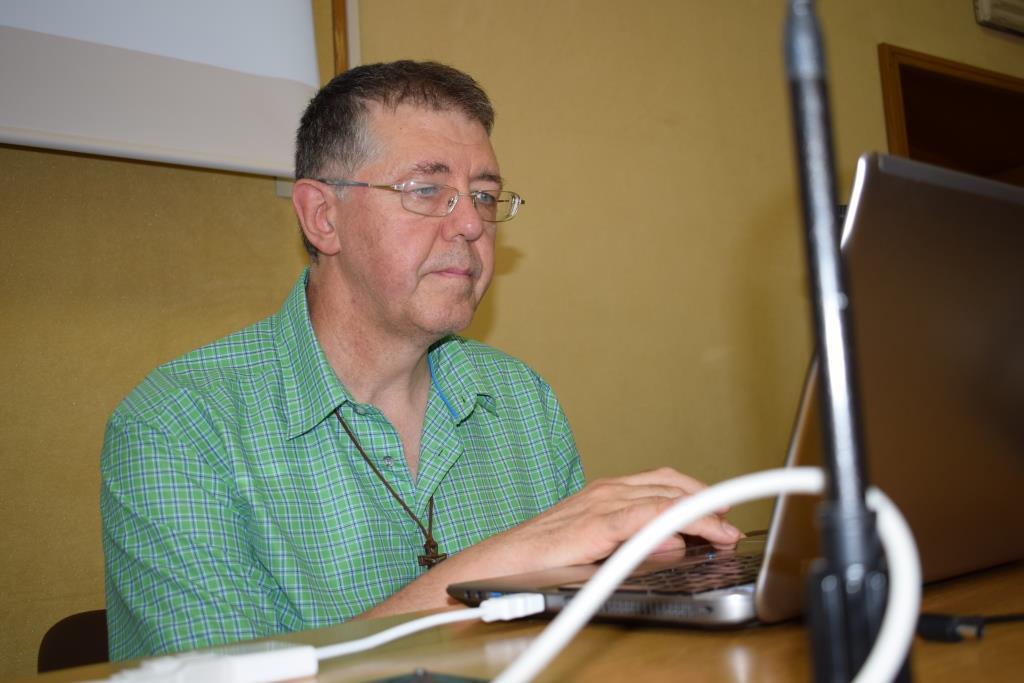Daniel Comboni
Comboni Missionaries
Institutional area
Other links
Newsletter
Monday, October 16, 2017
“From the first General Chapter in which I took part (1975) to the present day, the same refrain is continually repeated: evangelise by using poor means, cultivate a simple and austere lifestyle, simplify the oversized and burdensome structures, overcome individualism, engage in community and provincial discernment in the use of goods, and so forth. Does such insistence not show, perhaps, that the good resolutions were not followed up with more fitting decisions and attitudes?”, asked Fr. Manuel Ferreira Horta [in the picture], bursar of the Comboni province of Portugal.
PROVIDENCE – FORESIGHT
SELF-SUFFICIENCY
1. Divine Providence in Sacred Scripture
In the Bible, the face of God is that of a Father who watches over his creatures and provides for their needs. In Biblical language, when Divine Providence is mentioned, it is fundamentally in reference to two realities.
The first is the existence of God, the Creator and Lord of the Universe, who rules and governs all with infinite wisdom and orders all things towards the final goal of creation: the manifestation and the celebration of His glory. The second is the solicitude of God who provides for the needs of each one of the beings created by Him.
1.1 The psalms, with their great beauty and variety, are perhaps the most beautiful song of praise of the Providence of God.
“The heavens proclaim the glory of God and the firmament shows forth the work of his hands. No speech, no word, no voice is heard yet their span extends to all the earth, their words to the utmost bounds of the world” (Ps 19, 2, 4-5). “The eyes of all things look to you and you give them their food in due time. You open wide your hand and grant the desires of all who live” (Ps 145, 15, 16). It is He who keeps faith forever, who is just to those who are oppressed. It is He who gives food to the hungry, the Lord who sets prisoners free, who gives sight to the blind, who raises up those who are bowed down, the Lord, who protects the stranger, who loves the just and upholds the widow and orphan but thwarts the path of the wicked” (Ps 146,7-9).
1.2 In the history of salvation, the solicitude of God is continually affirmed. “God hears the cry of his people, is moved to compassion and decides to free them (Ex 3, 7-8); He frees them from the slavery of Egypt and leads them across the Red Sea dry-shod (Ex 14, 22); he provides the bread, water and meat needed for the survival of his people and, walking before them, He leads them to the land promised to Abraham and his descendants (Ex 16, 17).
1.3 Jesus, the revelation of the fatherly face of God, taught his disciples to pray to the Father asking only for their “daily bread” (Mt 6,11); and he told them not to worry too much about tomorrow because the Father knows what they need. He cares for the birds of the air that neither sow nor gather into barns, yet their Father feeds them; He cares for the lilies of the fields that neither work nor spin, yet their Father clothes them with clothing so splendid it surpasses even Solomon in all his glory (cf. Mt 6, 25-34).
1.4 As he prepared his disciples for their first mission, Jesus gave them precise instructions that apply also to our apostolic and missionary mission. “Take no gold or silver or copper coins in your purses, no haversack for your journey, no spare tunic or sandals or staff because the labourer has a right to his food. Declare that the Kingdom of God is near … you received freely, give freely” (cf. Mt 10, 5-10).
2. The Providence of God and our Founder
In the life of St. Daniel Comboni, trust in Providence is to be found in the origins of his vocation and in the way he sees the presence of God in all the events of his life. Providence is comfort in difficulty; it is Providence that guides him in drafting the Plan for the Evangelisation of Africa and in preparing and presenting the “Postulatum” to the First Vatican Council.
Divine Providence is seen in almost all his letters and reports to Propaganda Fide, in his most intense work of mission promotion and in his activities of evangelisation and it appears many times, identified with the plan, the will of God.
In a letter to Cardinal Simeoni (27.8.1880) Comboni writes: “Considering that the works of God are always born at the foot of the Calvary and must always be marked by the adorable seal of his Cross, so I have decided to abandon myself to the arms of Divine Providence, the source of charity for the poor, and the protector of innocence and justice…” (W 6085).
In a letter to Canon Giovanni Mitterrutzner (18.9.1865) he writes: “God’s works have to encounter difficulties. That is how they bear the beloved imprint of Providence. What a great joy it is to suffer for Africa. But the Plan will be carried out … we are not alone in that great work: there is God, the Virgin and many powerful mortals who want it to be realised” (W 1185).
3. Providence and Foresight
Trust in the Providence of God has nothing to do with passivity and even less with laziness.
In various parables, Jesus clearly shows that Providence is proportioned to our sense of responsibility and our desire to manage well the gifts and goods granted to us.
In the parable of the talents, Jesus praises the servants who succeeded in using well the talents they received, according to the ability of each one, and he rebukes the servant who buried his talent in the ground to return it intact to his master, so as not to run the risk of it being lost or stolen (Mt 25,14-27).
When Jesus multiplies the loaves to feed the multitude, he seeks the collaboration of his disciples: “give them something to eat yourselves”. But how? “All we have with us is five loaves and two fish”. The little that there was stands for the human collaboration; the miracle will do the rest and all ate and were satisfied with some pieces left over (Mt 14, 16-21; Mt 15, 32-38).
4. Providence and the Foresight of St. Daniel Comboni
Daniel Comboni had unlimited trust in the Providence of God but he did not wait for the material needs of the Mission to fall into his lap. He trusted in Providence and had great recourse to St. Joseph but worked tirelessly to obtain the help he needed; he wrote an enormous number of letters to friends and benefactors, to ordinary people as well as the rich and powerful, he founded the Annals of the Good Shepherd magazine to keep supporters in touch with the mission; he founded the Holy Redeemer Guild, conceived for the purpose of regular support for the needs of the mission.
In a letter to Cardinal Simeoni (24 April 1878) Comboni writes: “Now it is incumbent upon me to work very hard in these missions to further their spiritual welfare and I am obliged to write often to my private benefactors in Europe to extract from St. Joseph’s beard the financial aid” necessary for the mission.
Comboni’s trust in Providence and in the special intercession of St. Joseph has become proverbial and is now part of the Comboni spirituality handed down to the present day.
5. Providence, Foresight and the Rule of Life
The Rule of Life has codified the essentials of the charism and the spirituality lived by the Founder and the members of the Institute founded by him, in all its aspects: charism and spirituality, consecration to the Mission, missionary service, formation, mission promotion and evangelisation as well as its internal organisation and the administration of economic goods.
To live evangelical poverty is a life choice: “The missionary chooses voluntarily the poverty of Christ, leaving everything; he shares in the common law of work, places his material possessions in common, accepts limitations and dependence on the superiors in the use and disposition of goods and follows a simple lifestyle in order to be free to bring the evangelising message to the poorest and most abandoned and to live in solidarity with them” (RL 27; 1 Cor 9, 17-23).
The missionary lives his poverty with trust in the Providence of the Father who knows what he needs in order to free himself from being conditioned by material things. He accepts with equanimity scarcity and the lack of what is necessary (RL 27, 1).
The eyes of the world today are turned upon the Church and religious institutions and seriously question the “abundance of goods” which the Church and the institutions have or seem to have. Ostentation, comforts, bourgeois habits and, unfortunately, the cases of mismanagement and financial and other scandals have led to the spotlight being focused on the Church and its institutions to evaluate the credibility of our life and how we measure up to the values we proclaim.
Faced with the many refugees and migrants knocking on our doors and the increase of widespread poverty afflicting more than two thirds of humanity, we cannot exempt ourselves from a close analysis and serious discernment of the evangelical poverty of the Institute.
5.1 From the first General Chapter in which I took part (1975) to the present day, the same refrain is continually repeated: evangelise by using poor means, cultivate a simple and austere lifestyle, simplify the oversized and burdensome structures, overcome individualism, engage in community and provincial discernment in the use of goods, and so forth.
Does such insistence not show, perhaps, that the good resolutions were not followed up with more fitting decisions and attitudes?
5.2 The Rule of Life states “The missionary lives his poverty also by serious and dedicated daily work” (RL 27, 2). The example of St. Paul and the rebuke aimed at the community of Thessalonica should be for us a serious examination of conscience. “We worked night and day, slaving and straining, so as not to be a burden on any of you”; “... not to let anyone have any food if he refused to work ... In the Lord Jesus Christ, we order and call on people of this kind to go on quietly working and earning the food they eat” (2 Th. 3,8-13).
5.3 In recent General Chapters, the Total Common Fund was indicated as a valid initiative, an initiative to be encouraged in all the provinces for a more evangelical management of economic resources.
Much progress has been made but there is still much to be done to overcome resistance, to motivate commitment and to seek ways to overcome the passiveness of those who expect much but do very little to merit it. It is good to remember that the vow of poverty implies giving up the use and disposal of goods received without the community, provincial or Institute discernment and, as St. Paul says, “we have the right to eat only the bread that belongs to us” since it is also fruit of our labours (2 Th. 3,13).
6. The Rule of Life and Self-limitation
Wisely, and in conformity with the lifestyle of the Founder, the Rule of Life clearly indicates the fundamental orientations for the use of goods and lays down clear limits to the temptation to accumulate them.
“The Institute, as a community of brothers which gives witness to consecrated poverty, lives the communion of goods and uses them to attain its missionary purpose. Avoiding excessive gain and the accumulation of goods, it places its trust in Providence, recognizes the common law of work and willingly shares its goods with the Local Church and the poor” (RL 162). Following the example of the Founder, “He trusts in Providence through the special intercession of St. Joseph” (RV 162.2).
Again, according to the Rule of Life, “The Institute’s income is derived from the offerings of the people of God and from the work of the missionaries and communities; in addition it may come from investments, always safeguarding the witness of evangelical poverty” (RL 167). “Investments are to be considered supplementary; they are made to provide for the Institute’s needs and not for capital increase; they are governed by the norms contained in the Directory for Finance and in the Provincial Directory.” (RL 167.1).
6.1 Seeing the widespread poverty of today’s world, a number of missionaries question the amount of real estate owned by the General Administration and some provinces. Rather than abstract amounts, we may perhaps question the manner in which property is accumulated and the transparency of its purpose and the use made of it.
The creation of funds to foresee all possible situations and all possible emergencies may be a cover for diminishing or elimination of working capital; keeping funds that may be used only rarely is a form of capital accumulation.
The rules in our documents (directories) are quite clear and precise regarding the creation, the maximum amounts and the use of funds as well as rules for the limits of working capital; it is up to those responsible to see they are observed and put into practice.
6.2 It seems to me to be neither harmless nor allowable that, even while the Rule of Life affirms the collective patrimony (RL 163), there should be such great differences between the patrimonies of the different provinces. This means that the mechanisms created to make solidarity function are not yet sufficient to create a more equable distribution of the patrimony of the Institute. In all probability, besides the solidarity based on good will, there must also be an “institutional solidarity”, a sort of fixed tax to be placed on the riches created (PIB) in a single province or on its patrimony.
Initially, the Institute, through the General Administration, will be the most suitable channel to bring about the institutionalisation of solidarity.
7. Providence and Foresight in the present situation of the Institute
If the main source of our income must be the People of God and the work of the community and the missionaries, “after the example of our Founder, the Institute assumes the duty of stimulating the missionary conscience of the people of God so that they recognize their missionary responsibility and commit themselves to proclaiming the Gospel to the whole world (Cf. RL 72). Because of this, in all provinces, all the communities are centres of mission promotion through the most varied initiatives” (cf. RL 75, 75.1).
Throughout our history, we have had great figures of missionary promoters who may be of inspiration to us even today. The witness of the missionaries is fundamental for the sensitisation of the people of God; therefore, missionary weeks, triduums or mission Sundays, retreats and meetings, the presence in the country of numerous missionary benefactors and collaborators have traditionally been the means most used in seeking to create a missionary presence network among the people of God.
It is true that today some parishes are somewhat opposed to the initiatives of the missionaries, especially when seen as means of collecting funds; but if some doors are closed, there are always others that are opened when we have faith and courage. It is true that some initiatives of the past seem less suitable today; innovation and creativity may be of help to find new forms to ensure the necessary contact with the people of God.
It is true that many of our benefactors are already old and are passing away; in this area it is absolutely fundamental to guarantee continuity and show our gratitude, affection and appreciation through prayer and many other small gestures which our predecessors managed to provide.
It is also true that the younger generations are more distant from the institutional Church but they are still extremely sensitive to solidarity and commitment in the fields of justice, peace and the integrity of creation.
There are many and immediate areopagi in which we may let the proclamation of the Gospel resound and invite Christian and missionary commitment; in the list of these new possibilities we cannot fail to mention the new digital, visual and written means of communication, the latter having a long tradition and abundant fruits in the field of sensitisation and the missionary formation of the people of God.
8. Providence and Self-sufficiency
Trust in Divine Providence and in the diverse forms in which it manifests itself to us does not exempt us from seeking to ensure the self-sufficiency (at least in part) of our life and missionary activities.
While in some provinces the problem has not been faced with any seriousness, in others it is already a cause for concern.
A glance at the report of the General Administration for the year 2016 shows that the contribution by the confreres to ordinary expenses is only 29% with the 61% being provided by increasingly haphazard financial income.
We also see that extraordinary expenditure, which includes financing various funds (basic formation, ongoing formation, the sick, solidarity and extraordinary contributions), is met by ordinary and extraordinary contributions by the provinces (71%) and by inheritance and legacies (29%).
Without the financial income and the extraordinary contributions of the provinces, the General Administration could not provide for its normal running costs or for the other vital necessities that it guarantees (basic and ongoing formation, the sick,etc.). This is the reason why, at this time, the key word which allows us to survive is “solidarity” and this has a lot to do with the present economic and patrimonial situation of the provinces of the “Western world”. Looking to the future, to speak seriously of self-sufficiency implies:
8.1 A substantial lowering of our standard of life (to a level that is simple and austere as indicated so often in our Rule of Life and in other documents). In Fatima, Pope Francis spoke of “a Church that is poor in means and rich in love and mercy” (Homily 13.5.2017).
8.2 Bringing our structures – too large and too burdensome – into line with our charism or with an ecclesial or social service so that they may become profitable or at least self-sufficient or, in the final analysis, disposing of them while avoiding selling them off (CA 2015, 83). The systematic selling off of property, besides being difficult and causing the decrease in value of our real estate, does not seem to have been the way followed by other Institutes similar to ours.
8.3 Conforming our style of organisation and government so as to make it more simple, less burdensome and more suitable for the present situation of the Institute (fewer assemblies, meetings and journeys …). It is possible today to avoid unnecessary gatherings with the click of a mouse and achieve the same goals and results, practically speaking.
8.4 Aiming to have high quality mission promotion in all the provinces. In some cases, embellishing and renewing already existing initiatives; in others, beginning to create the base for mission promotion that may produce medium term results. In some cases, the conditions exist for bringing about systematic support by means of newsletters and also by launching the Holy Redeemer Guild which, in many provinces, continues to produce excellent results.
8.5 In the provinces where we already have a good number of local members, it would be good to make our presence stable by taking some key parishes so that they may become poles of mission promotion, inverting the practice of handing over well-founded parishes and following instead the example of other Institutes.
It is good to ensure that the provincial and formation houses are built on land belonging to the Institute and that the property be registered in the name of the Institute, or, if this is not possible, in the name of the diocese with a lasting contract recognised by the ecclesiastical organisms.
8.6 Progressively providing the less well-off provinces with some real estate (houses, etc.) which may be let to provide a steady income. This initiative must be managed with responsibility and competence and could also be a means of reducing monetary capital which today is ever more unstable and difficult to manage and investing in real estate, which is more reliable and, at the moment, more profitable.
8.7 Almost all the provinces possess monetary and financial capital. The volatility and complexity of financial markets and the strict national and international rules demand a degree of experience and technical competence that not all provincial bursars may have. Up to now, the General Economate and some provinces and procures (Italy, DSP, NAP…) have functioned as channels for administering the patrimonies of the various provinces.
The new international norms regarding transparency both of property and the various movements of capital, have obliged us to make some changes to bring our administration into line with the new norms. The choice of trusted institutions, the diversification of products and also of institutions, the ethical aspect, clarity and transparency in investments, prudence and consultation are criteria to be always kept in mind so that the degree of risk, always present in this sector, may be kept to a minimum.
The need to have accounts reviewed by external consultants will force us to adopt a more technical administration that is more rigorous and responsible, of the goods that Providence continues to entrust to us with such great goodness and generosity.
8.8 The possibility of creating a Provident Fund within the Institute has been under study for some time, having in mind the provinces where there is no form of support or social security.
From the results of studies and consultations, the initiative seems possible; the two main problems are the creation of the initial capital which, in principle, may be provided by the Institute and the monthly quota that the provinces should contribute, which may be quite considerable due to the marked tendency towards a diminution of interest on low or moderate risk investments. The matter will continue to be discussed until there is a proposal that provides a guarantee of success.
Fr. Manuel Ferreira Horta
Questions for reflection
1. Are we convinced that we must change our style of life, scale down our structures and reform our organisation and government so that we may live and witness to evangelical poverty?
2. Do we accept the Total Common fund as the best way to overcome individualism, submitting our reports to community discernment and giving priority to that which is essential in our evangelisation?
3. Solidarity is the key to overcoming inequalities in the Institute and helping the poorest. Is our trust in Providence great enough to move us to share not only what is “superfluous” but even what we might need one day?




